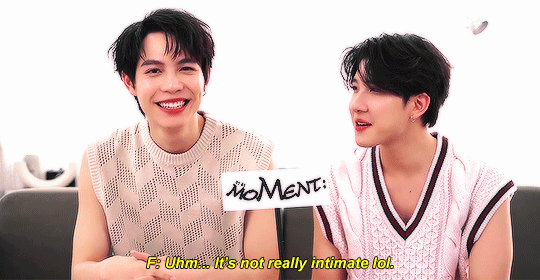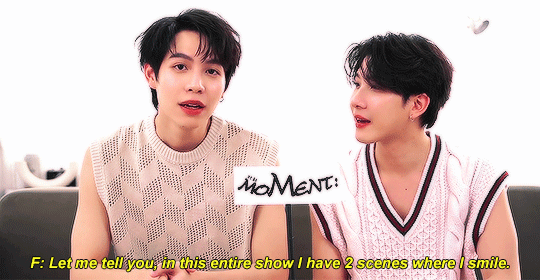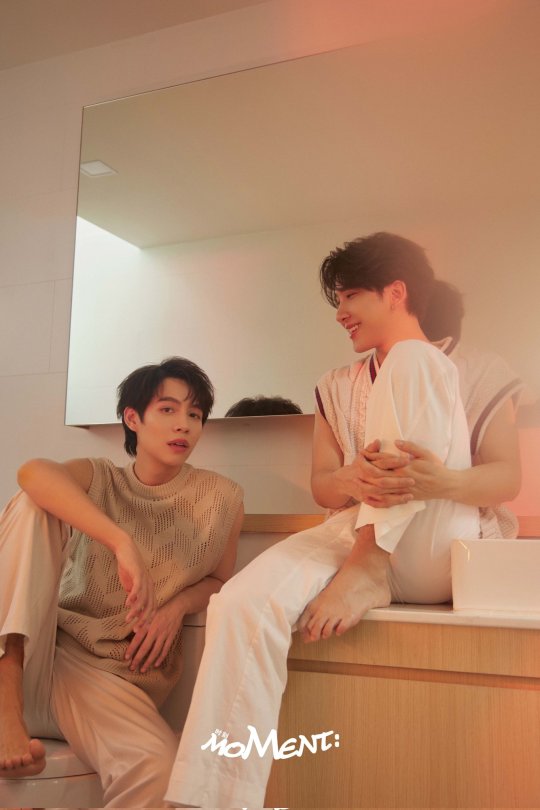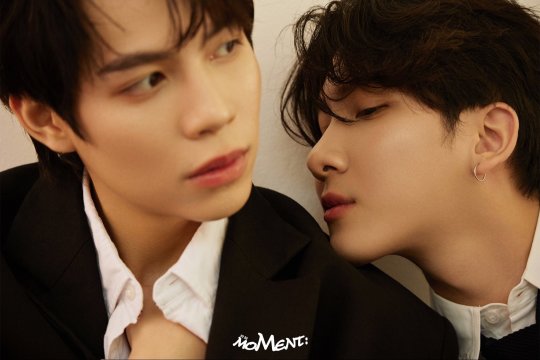#Moment Magazine
Explore tagged Tumblr posts
Photo








he made him smile 🥺
#firstkhao#firstkhaotung#alan x gaipa#moonlight chicken#first kanaphan#khaotung thanawat#gmmtv#moment magazine#my subs#this was recorded while MLC was still airing which is why khao says its not over yet lol#also dont judge me for giffing something old but i just miss my boys okay 😩#i need them on my blog
768 notes
·
View notes
Text




Wow…. 👀
Looking mighty fine here boys!
First Kanaphan and Khaotung Thanawat for Moment Magazine
09/03/2023
#first kanaphan puitrakul#first kanaphan#firstkhao#khaotung thanawat ratanakitpaisan#first khaotung#khaotung thanawat#first x khao#these boys are looking smoking hot 🔥 and I completely approve!#moonlight chicken#the eclipse#only friends the series#our skyy 2#akkayan#akk x ayan#alangaipa#gmmtv actors#thai bl#moment magazine
152 notes
·
View notes
Text

FirstKhao kittens moment
(just because I miss drawing aww)
#Thinking about opening commissions for 2 months...#I wonder if anybody is interested#anyway I miss drawing for real the one that's pleasurable and not frustrating#firstkhao#first khaotung#moment magazine#dropthefanart#dropthefanart eclipse#dropthefanart thai#thai actors
29 notes
·
View notes
Text



FirstKhao for MomentMagazine 14.03.2023
31 notes
·
View notes
Text

What’s up with how the dunmeshi fandom just lies about this kind of stuff all the time. It is easily confirmable information that it was a monthly series, something incredibly common in the industry.

A not weekly magazine schedule is literally common !! Especially in the seinen shoujo and josei demographics, sometimes monthly, sometimes biweekly, sometimes every two months, sometimes seasonal! Please stop lying about how Dunmeshi was some special unique creation that defies all standards of manga just to hype it up because it is so clear that every single one of these comparisons is centered around Weekly Shonen Jump (and understand that SJ has many magazines under its brand that are monthly or semimonthly). Not everything is WSJ and it needs to stop being the only point of reference in conversations like this 🤧
#sorry im having a moment.#kris actually talks#I can elaborate more on this bc I’m a nerd but like#I hope this doesn’t come off as disagreeing with the idea of moving more magazines off weekly schedules#but maybe let’s not lie ??? and act like tons of series including popular ones aren’t already in monthly ones#dungeon meshi#delicious in dungeon#adding the tag also now that it’s going around anyways. hi guys.#sorry for not including alt text originally I was not expecting reblogs but I have added it now o7#blah blah check reblogs with comments for additional thoughts from me if you care etc etc
22K notes
·
View notes
Text

Cannot even fault them for that that's funny as fuck
10K notes
·
View notes
Photo

Watch a videotaped discussion of AND THE BRIDE CLOSED THE DOOR by Ronit Matalon, sponsored by Moment Magazine, with Shulamit Reinharz, Brandeis University's former director of Women's Studies, and Moment book editor Amy E. Schwartz. Reinharz calls the book, translated by Jessica Cohen, "an outrageously funny, perplexing and perhaps universal story."
https://momentmag.com/and-the-bride-closed-the-door-by-ronit-matalon-with-shulamit-reinharz-2/
#New Vessel Press#And the Bride Closed the Door#Ronit Matalon#Israeli literature#translation#Jessica Cohen#women in translation#Moment Magazine#wedding madness
0 notes
Text
Also have another “first words spoken to you are on your skin” soulmate AU idea where Kara is a journalist assigned to shadow the controversial CEO of L-Corp for the day. It’s a big deal for her to get this assignment, so of course she trips the second she’s near the other woman and tries awkwardly to redeem herself.
The CEO stares at her almost in shock, and then says nothing. At all. Ever, for the entire day.
Kara spends hours following Lena Luthor around trying to fill the silence, but no amount of questions get her to talk. Lena almost seems to be running away at some points - like she’s trying to lose her? - and the few times she’s managed to catch her actually talking to someone she goes silent the second she sees Kara.
She asks around if Miss Luthor is usually like this and everyone looks at her like she’s crazy. Apparently she’s the only one who gets the silent treatment. By the end of her first day shadowing she’s walking away with half a page of observations and not a single quote. Miss Grant is going to kill her.
But that’s okay. It’s fine, this isn’t over. She has four days of shadowing ahead of her and she’ll be damned if she doesn’t finish this with a quote from the woman herself. It’s only a matter of time.
#what if you were an over stressed billionaire who feels like your existence must be a constant apology for the sins of your family#and you’re about to be followed around and studied by some no named baby reporter sent from a fashion magazine#you’re battling the migraine of a century you have five crises to settle all at once and also that baby reporter just said your words#the ones you’ve carried for the last decade - the ones you’ve feared and hoped for ever since#and it’s wonderful probably - this is what people dream of - but the problem is you just don’t have time for this#you can’t have your big soulmate moment#not right now. definitely not with this reporter. it’s not the right time#so I guess those words will just have to wait until it is time#if you can someone manage to resist. it’ll be hard#she does seem like someone it’d be really easy to talk to after all#good luck to you both#soulmate AU#Supercorp#fun shenanigan that I shan’t be writing#mine
931 notes
·
View notes
Text

Alexander McQueen ss07
#fashion#highfashion#hautefashion#haute couture#couture fashion#alexander mcqueen#sarabande#ss07#fashion moments#leather moulded dress#insane#actually obsessed with this#pintetest#moodboard#obsessed#high fashion#i need this#fashion meets art#couture#trending#fashion week#vogue magazine
405 notes
·
View notes
Text
patience being tested. being forced by a bizarre unfortunate situation to adhere to university requirement technicality by taking this simple basic elementary "introduction to environmental history" class.
this class is from facilitators/program which do, like, "history of the American frontier" or "history of fishing and hunting" and still basically subscribe to that old-school twentieth-century idealization and celebration of characters like Teddy Roosevelt and reverence for a mythical arc-of-history-bent-towards-justice narrative of the often-clumsy but ultimately-benevolent US federal government and its mission to "save nature" through the miracle of "sustained yield," while heroic federal land management agencies and "heritage" institutions lead to way, staffed by exceptional individuals (appeals to nostalgia for the frontier and an imagined landscape of the American West; ego-stroking appeals to flattering self-image that center the environmentalist or academic). where they invoke, y'know, ideas like "ecology is important because don't you enjoy cross-country skiing in The Woods with your niece and nephew? don't you like hunting and fishing?" which makes it feel like a time capsule of appeals and discourses from the 1970s. and it invokes concept of "untouched wilderness" (while eliding scale of historical Indigenous environmental relationships and current ongoing colonial violence/extractivism). but just ever-so-slightly updated with a little bit of chic twenty-first-century flair like a superficial land acknowledgement or a reference to "labor histories" or "history from below," which is extra aggravating when the old ideologies/institutions are still in power but they're muddying the water and diluting the language/frameworks (it's been strange, watching words like "multispecies" and "Anthropocene" over the years slowly but surely show-up on the posters, fliers, course descriptions, by now even appearing adjacent to the agri-business and resource extraction feeder programs, like a recuperation or appropriation.) even from a humanities angle, it's still, they're talking at me like "You probably didn't know this, but environmental history is actually pretty entangled with political and social events. In fact, we can synthesize sources and glean environmental info from wacky places like workers' rolls in factories, ship's logs, and poetry from the era." and i'm nodding like YEP.
the first homework assignment is respond to this: "Define and describe 'the Anthropocene'. Do you think 'the Anthropocene' is a useful concept? Why or why not?" Respond in 300 words.
so for fun, right now in class, going to see how fast i can pull up discussion of Anthropocene-as-concept solely from my old posts on this microblogging site.
---
ok, found some
---
I think that the danger in any universal narrative or epoch or principle is exactly that it can itself become a colonizing force. [...] I’m suspicious of the Anthropocene as concept for the very reason that it subsumes so many peoples, nations, histories, geographies, political orders. For that reason, I think ideas like the Anthropocene can be a useful short-hand for a cluster of tangible things going on with the Earth at the moment, but we have to be very careful about how fluid and dynamic ideas become concretized into hegemonic principles in the hands of researchers, policymakers, and politicians. There’s so much diversity in histories and experiences and environmental realities even between relatively linked geographies here in Canada [...]. Imagine what happens when we try to do that on a global scale - and a lot of euro-western Anthropocene, climate change and resilience research risks doing that - eliding local specificities and appropriating knowledge to serve a broader euro-western narrative without attending to the inherent colonial and imperial realities of science and policy processes, or even attending to the ways that colonial capitalist expansion has created these environmental crises to begin with. While we, as a collective humanity, are struggling with the realities of the Anthropocene, it is dangerous to erase the specific histories, power-relations, political orders that created the crisis to begin with. So, I’m glad that a robust critique of the Anthropocene as a concept is emerging.
Text by: Words of Zoe Todd, as interviewed and transcribed by Caroline Picard. “The Future is Elastic (But it Depends): An Interview with Zoe Todd.” 23 August 2016.
---
---
---
The Great Acceleration is the latest in a series of human-driven planetary changes that constitute what a rising chorus of scientists, social scientists, and humanists have labeled the Anthropocene - a new Age of Humans. [...] But what the Anthropocene label masks, and what the litany of graphs documenting the Great Acceleration hide, is a history of racial oppression and violence, along with wealth inequality, that has built and sustained engines of economic growth and consumption over the last four centuries. [...] The plantation, Sidney Mintz long ago observed, was a “synthesis of field and factory,” an agro-industrial system of enterprise [...]. Plantation legacies, along with accompanying strategies of survival and resistance, dwell in the racialized geographies of the United States’ and Brazil’s prison systems. They surface in the inequitable toxic burdens experienced by impoverished communities of color in places like Cancer Alley, an industrial corridor of petrochemical plants running along the Mississippi River from New Orleans to Baton Rouge, where cotton was once king. And they appear in patterns of foreign direct investment and debt servitude that structure many land deals in the Caribbean, Brazil, and sub-Saharan Africa [...]. [C]limatologists and global change scientists from the University of London, propose instead 1610 as a date for the golden spike of the Anthropocene. The date marked a detectable global dip in carbon dioxide concentrations, precipitated, they argue, by the death of nearly 50 million indigenous human inhabitants [...]. The degradation of soils in the tobacco and cotton-growing regions in the American South, or in the sugarcane growing fields of many Caribbean islands, for example, was a consequence of an economic and social system that inflicted violence upon the land and the people enslaved to work it. Such violent histories are not so readily evident in genealogies that date the Anthropocene’s emergence to the Neolithic Revolution 12,000 years ago, the onset of Europe’s industrial revolution circa 1800, or the Trinity nuclear test of 1945. Sugarcane plantations were already prevalent throughout the Mediterranean basin during the late middle ages. But it was during the early modern era, and specifically in the Caribbean, where the intersection of emerging proto-capitalist economic models based on migratory forced labor (first indentured servitude, and later slavery), intensive land usage, globalized commerce, and colonial regimes sustained on the basis of relentless racialized violence, gave rise to the transformative models of plantations that reshaped the lives and livelihoods of human and non-human beings on a planetary scale. [...] We might, following the lead of science studies scholar Donna Haraway and anthropologist Anna Tsing, more aptly designate this era the Plantationocene. [...] It is also an invitation to see, in the words of geographer Laura Pulido, “the Anthropocene as a racial process,” one that has and will continue to produce “racially uneven vulnerability and death." [...] And how have such material transformations sustained global flows of knowledge and capital that continue to reproduce the plantation in enduring ways?
Text by: Sophie Sapp Moore, Monique Allewaert, Pablo F. Gomez, and Gregg Mitman. "Plantation Legacies." Edge Effects. 22 January 2019. Updated 15 May 2021. [Bold emphasis added by me.]
---
---
---
Geologists and other scientists will fight over [the definition of the beginning start-date of the Anthropocene] in scientific language, seeking traces of carbon dioxide that index the worst offenses of European empire which rent and violated the flesh, bodies, and governance structures of Indigenous and other sovereign peoples in the name of gold, lumber, trade, land, and power. [...] The stories we tell about the origins of the Anthropocene implicate how we understand the relations we have with our surrounds. In other words, the naming of the Anthropocene epoch and its start date have implications not just for how we understand the world, but this understanding will have material consequences, consequences that affect body and land.
Text by: Heather Davis and Zoe Todd. On the Importance of a Date, or Decolonizing the Anthropocene. ACME An International Journal for Critical Geographies. December 2017. [Bold emphasis added by me.]
---
---
---
From Aime and Suzanne Cesaire, C. L. R. James, Claudia Jones, Eduoard Glissant, through Sylvia Wynter, Christina Sharpe, and so many others, critical anticolonial and race theory has been written from the specific histories that marked the Black Atlantic. [...] Glissant also reminds us, secondly, of how cunning the absorptive powers of [...] liberal capitalism are - how quickly specific relations are remade as relations-erasing universal abstractions. [...] This absorptive, relations-erasing universalism is especially apparent in some contemporary discourses of […] liberalism and climate collapse - what some call the Anthropocene - especially those that anchor the crisis in a general Human calamity which, as Sylvia Wynter has noted, is merely the name of an overdetermined and specific [White] European man. […] [T]he condition of creating this new common European world was the destruction of a multitude of existing black and brown worlds. The tsunami of colonialism was not seen as affecting humanity, but [...] these specific people. They were specific - what happened to them may have been necessary, regrettable, intentional, accidental - but it is always them. It is only when these ancestral histories became present for some, for those who had long benefitted from the dispossession [...], that suddenly the problem is all of us, as human catastrophe.
Text by: Elizabeth Povinelli. “The Ancestral Present of Oceanic Illusions: Connected and Differentiated in Late Toxic Liberalism.” e-flux Journal Issue #112. October 2020.
---
The narrative arc [of White "liberal humanism"] [...] is often told as a kind of European coming-of-age story. […] The Anthropocene discourse follows the same coming-of-age [...] script, searching for a material origin story that would explain the newly identified trajectory of the Anthropos […]. Sylvia Wynter, W.E.B. DuBois, and Achille Mbembe all showed how that genealogy of [White subjecthood] was [...] articulated through sixteenth- through nineteenth-century [historiographies and discourses] in the context of colonialism, [...] as well as forming the material praxis of their rearrangement (through mining, ecological rearrangements and extractions, and forms of geologic displacements such as plantations, dams, fertilizers, crops, and introduction of “alien” animals). […] As Wynter (2000) commented, “The degradation of concrete humans, that was/is the price of empire, of the kind of [Eurocentric epistemology] that underlies it” (154).
Text by: Kathryn Yusoff. “The Inhumanities.” Annals of the American Association of Geographers, Volume 11, Issue 3. November 2020.
---
---
---
As Yarimar Bonilla suggests in regard to post-Irma-and-Maria Puerto Rico, “vulnerability is not simply a product of natural conditions; it is a political state and a colonial condition.” Many in the Caribbean therefore speak about the coloniality of disaster, and the unnaturalness of these “natural” disasters [...]. Others describe this temporality by shifting [...] toward an idea of the Plantationocene [...]. As Moore and her colleagues write, “Plantation worlds, both past and present, offer a powerful reminder that environmental problems cannot be decoupled from histories of colonialism, capitalism, and racism that have made some human beings more vulnerable [...].” [W]e see that contemporary uneven socioecologies associated with the rise of the industrial world ["the Anthropocene"] are based [...] also on the racialized denial and foreshortening of life for the sacrificial majority of black, brown, and Indigenous people and their relegation to the “sacrifice zones” of extractive industry. [...] [A]ny appropriate response to the contemporary climate emergency must first appreciate its foundations in the past history of the violent, coercive, transatlantic system of plantation slavery; in the present global uneven development, antiblackness, and border regimes that shape human vulnerability [...] that continues to influence who has access to resources, safety, and preferable ecologies [...] and who will be relegated to the “plantation archipelagoes” (as Sylvia Wynter called them) [...].
Text by: Mimi Sheller. “Thinking Beyond Coloniality: Toward Radical Caribbean Futures.” Small Axe (2021), 25 (2 (65)), pages 169-170. Published 1 July 2021. [Bold emphasis added by me.]
---
---
---
Indigenous genocide and removal from land and enslavement are prerequisites for power becoming operationalized in premodernity [...]; it was/is a means to operationalize extraction (therefore race should be considered as foundational rather than as periphery to the production of those structures and of global space). [...] Wynter suggests that we […] consider 1452 as the beginning of the New World, as African slaves are put to work on the first plantations on the Portuguese island of Madeira, initiating the “sugar-slave” complex - a massive replantation of ecologies and forced relocation of people […]. Wynter argues that the invention of the figure of Man in 1492 as the Portuguese [and Spanish] travel to the Americas instigates at the same time “a refiguring of humanness” in the idea of race. [...] The natal moment of the 1800 Industrial Revolution, […] [apparently] locates Anthropocene origination in […] the "new" metabolisms of technology and matter enabled by the combination of fossil fuels, new engines, and the world as market. […] The racialization of epistemologies of life and nonlife is important to note here […]. While [this industrialization in the nineteenth century] […] undoubtedly transformed the atmosphere with […] coal, the creation of another kind of weather had already established its salient forms in the mine and on the plantation. Paying attention to the prehistory of capital and its bodily labor, both within coal cultures and on plantations that literally put “sugar in the bowl” (as Nina Simone sings) […]. The new modes of material accumulation and production in the Industrial Revolution are relational to and dependent on their preproductive forms in slavery […]. In 1833, Parliament finally abolished slavery in the British Caribbean, and the taxpayer payout of £20 million in “compensation” [paid by the government to slave owners for their lost "property"] built the material, geophysical (railways, mines, factories), and imperial infrastructures of Britain and its colonial enterprises and empire. [...] A significant proportion of funds were invested in the railway system connecting London and Birmingham (home of cotton production and […] manufacturing for plantations), Cambridge and Oxford, and Wales and the Midlands (for coal). Insurance companies flourished [...]. The slave-sugar-coal nexus both substantially enriched Britain and made it possible for it to transition into a colonial industrialized power […]. The slave trade […] fashioned the economic conditions (and institutions, such as the insurance and finance industries) for industrialization.
Text by: Kathryn Yusoff. "White Utopia/Black Inferno: Life on a Geologic Spike". e-flux Journal Issue #97. February 2019. [Bold emphasis added by me.]
#sorry for being mean#instructor makes podcasts about cowboys HELP ME#and he recently won a New Business award for his startup magazine covering Democrat party politics in local area HELP#so hes constantly performing this like dance between new hip beerfest winebar coolness and oldfashioned masculinity#but hes in charge of the certificate program so i have to just shut up and keep my head down for approximately one year#his email address is almost identical to mine and invokes enviro history terms but i made mine long before when i was ten years old#so i could log in to fieldherpforum dot com to talk about enviro history of distribution range changes in local reptiles and amphibians#sir if you read my blog then i apologize ive had a long year#and i cant do anything to escape i am disabled i am constantly sick im working fulltime i have NO family i have NO resources#i took all of this schools graduate level enviro history courses and seminars years ago and ran the geography and enviro hist club#but then left in final semester because sudden hospitalization and crippled and disabled which led to homelessness#which means that as far as any profession or school is concerned im nobody im a retail employee#i was doing conference paper revisions while sleeping on concrete vomiting walking around on my cane to find outdoor wifi#and im not kidding the MONTH i got back into a house and was like ok going back to finish the semester the school had#put my whole degree program and department in moratorium from lack of funding#and so required starting some stuff from scratch and now feel like a hostage with debt or worsening health that could pounce any moment#to even get back in current program i was working sixteen hours a day to pay old library fines and had to delicately back out of workplace#where manager was straight up violently physically abusive to her vulnerable employees and threatened retaliation#like an emotional torturer the likes of which i thought existed only in cartoons#and the week i filed for student aid a massive storm had knocked out electricity for days and i was clearing fallen tree debris#and then sitting in the dark in my room between job shifts no music no phone no food with my fingers crossed and i consider it a miracle#sorry dont mean to dramatize or draw attention to myself#so actually im happy you and i are alive
134 notes
·
View notes
Photo








First & Khaotung for Moment Magazine
#firstkhao#firstkhaotung#first kanaphan#khaotung thanawat#gmmtv#moment magazine#😩??????#the third one.........#im having trouble keeping my sanity#SIRS THIS IS A MCDONALDS#PLEASE#🥺😭
557 notes
·
View notes
Text




First Kanaphan and Khaotung Thanawat for Moment (photoshoot)
Yup, the boys continue to look amazing 🙇🏻♀️❤️💫
#thai bl#gmmtv actors#khaotung thanawat ratanakitpaisan#first kanaphan puitrakul#first kanaphan#khaotung thanawat#firstkhaotung#firstkhao#first khaotung#khaotungfirst#these 2 boys are going places and I completely approved 👍#the eclipse#our skyy2#only friends the series#moonlight chicken#akk x ayan#akkayan#alangaipa#moment magazine
104 notes
·
View notes
Text

Raven
Photo by Christine Ward.
The Decisive Moments Magazine (TDM)
#christine ward#photographer#raven#bird photography#the decisive moments magazine (tdm)#instagram#nature
1K notes
·
View notes
Text

first.kp igs 25.03.2023
13 notes
·
View notes
Text
«You're the best nephew a multibillionaire could wish for!»

Paperino baciato dalla sfortuna (2024)
#🥺🥺🥺#awww#what a beautiful moment#(which doesn't happen too often)#scrooge mcduck#donald duck#uncle scrooge & donald#luca barbieri#luca usai#topolino magazine#disney ducks#italian disney comics
196 notes
·
View notes
Text

Bella Hadid , W Magazine.
#bella hadid#minimal fashion#fashion#style#fashion photography#photography#photooftheday#women's fashion#minimal aesthetic#minimalism#esthetics#aesthetics#trends#women#fashion_collection#minimalistic#fashion editorial#editorial#urban#life#captured#minimal#urban fantasy#living in the moment#photoshoot#photo#urban style#urbanlife#w magazine#supermodel
122 notes
·
View notes